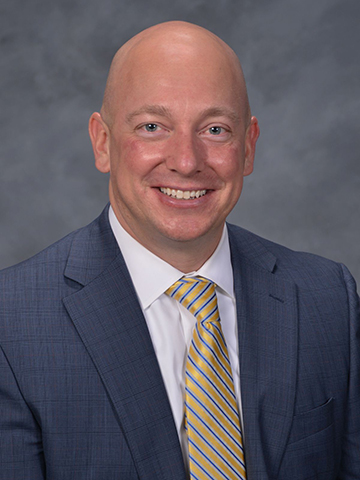Professor and former CEO Jake Redden, DHSc, MHA, MPH, FACHE Joins Saint Louis University Health Management and Policy Department
The Saint Louis University College for Public Health and Social Justice has named Jake Redden, DHSc, MHA, MPH, FACHE as a non-tenure track associate professor in the Department for Health Management and Policy.
Dr. Redden comes to Saint Louis University after more than 15 years of experience in overseeing healthcare operations, systems management, and performance improvement.

Most recently Dr. Redden’s career took him to Minnesota where he serves as Chief Executive Officer of a independent, rural, critical access hospital, while fulfilling roles as an adjunct professor at Rutgers University Edward J. Bloustein School of Planning and Public Policy, the University of Maryland, and West Coast University. Prior to taking his most recent leadership role, Dr. Redden served as Chief Quality Officer & Interim Leadership Coach for HRO Leaders LLC in Boston. His leadership experience also includes strategic leadership roles in the Inova Health System and the VA Health Care System, and he also is a United States Navy veteran.
Dr. Redden also sits on multiple advisory boards in the health care arena.
Dr. Redden’s passion for health care management education, research, and mentorship led him through a natural transition from graduate studies, field work, and engagement with his peers. After completing his doctorate from A.T. Still University of Health Sciences, he was offered a graduate school teaching position and will now bring his experience in health care leadership to full-time academia.
For Dr. Redden, the pivot from health care practice to education has been relevant to both ends of the health care landscape because of the needs of growing health systems.
“I am continually presented with just how much needs to be changed in healthcare to help create the health system to achieve the service promise our patients and our communities look for every day. We have some real issues, such as cost, access, workforce, and quality outcomes, that real leadership that strives to reinvent healthcare delivery is needed,” he said. “From my early days in process improvement and patient safety, change management is at the heart of what we do, and now as a senior leader, I am still using that same tool box to drive the changes needed.”
“Every day, as a leader in healthcare, you have the ability to drive that change and empower innovation in the care we deliver.”
With stints in other positions across health care on multiple boards, in strategy management, as an executive director, Dr. Redden has seen first-hand the needs of systems but also has equipped himself with tools to lead the next crop of health managers and administrators.
As a leader, Dr. Redden sees his value in the accomplishments of former peers, students and employees.
“It is the building of leaders in others that reflect the real value we can leave behind in the organizations we are privileged to serve,” he said.
Fr. Michael Rozier, SJ, PhD, chair of the Department of Health Management and Policy, indicated that Dr. Redden brings the exact combination of experience the Department was seeking in a new faculty member.
“Our students are increasingly interested in seeing the connections between the classroom and industry. Dr. Redden’s experience in hospital leadership and consulting will bring that connection to life for them. Moreover, he exhibits some of our Department’s core values such as excellence and creativity, which will help form our students into the leaders our health system genuinely needs,” Fr. Rozier said.
Dr. Redden explains not only the need for building leaders that leave behind value but also need for more efficient and effective operations, something that he addresses in his research.
Coming from the operations side of the house, Dr. Redden naturally has seen the need for those increased efficiencies and the need to put them in place to help propel health care into the future.
“My research has always been, and continues to be…how to bring the right tools to our front lines faster and more actionable for users,” he said.
His research and field work stress the importance of empowering patients and increasing the transparency of health systems. Both are factors that he points to being out front of recent changes.
“This is attributed to both health care policy shifts using measures as a way to encourage continuous quality improvement by health care organizations, and the improved flow of everyday consumer education, channeled by online data sources and collaboration,” Dr. Redden said. “In the next decade, we should see an enormous shift in how health care is delivered, enabled by artificial intelligent solutions and necessitated by workforce shortage dynamics.”
As an educator, Dr. Redden says that educators need to introduce, in a more actionable way, the soft skills that make leaders more effective, such as change leadership, systems strategic thinking, risk taking, and innovation.
“We need better solutions, better collaboration, and rapid, accountable change to occur and it will take talented leaders to deliver it,” he said.
College for Public Health and Social Justice
The Saint Louis University College for Public Health and Social Justice is the only academic unit of its kind, studying social, environmental and physical influences that together determine the health and well-being of people and communities. It also is the only accredited school or college of public health among nearly 250 Catholic institutions of higher education in the United States. Guided by a mission of social justice and focus on finding innovative and collaborative solutions for complex health problems, the college offers nationally recognized programs in public health and health administration.